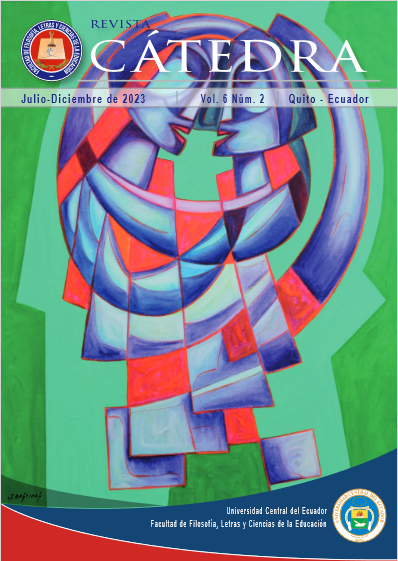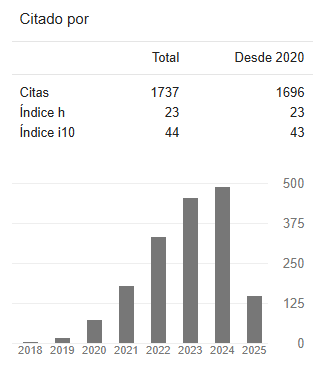Artificial Intelligence for analyzing academic performance in higher education institutions. A systematic literature review
DOI:
https://doi.org/10.29166/catedra.v6i2.4408Keywords:
higher education, artificial intelligence, academic performance, systematic reviewAbstract
Artificial intelligence is constantly evolving and is being applied in several areas, including education. The analysis of the academic performance of students in higher education institutions is a critical issue for decision making and improving the quality of education. The objective of this article is to perform a systematic review of the literature, considering the research that has been developed using artificial intelligence techniques to analyze academic performance in higher education institutions. The scientific databases Web of Science, Scopus, and IEEE Xplore were considered. Keywords related to artificial intelligence and academic performance were considered. Articles published from January 2017 to December 2022 were taken into account, 1427 manuscripts were obtained, from which 74 were selected and analyzed, according to the predefined inclusion and exclusion criteria. Among the results obtained, it can be indicated that the most used techniques for the prediction of academic performance are: neural networks and decision trees. In conclusion, it can be indicated that the application of artificial intelligence can improve the efficiency and accuracy of the evaluation, and provide valuable information for decision making and improvement of the quality of education. In addition, the implications and limitations of these studies are discussed and areas for future research are proposed.
Downloads
References
Alghamdi, R. A. (2020). Predicting the academic performance of university students using an ensemble classification approach. International Journal of Emerging Technologies in Learning (iJET), 15(02), 148-161.
Almaraz Menéndez, F., Maz Machado Carmen López Esteban, A., Almaraz Menéndez, F., Maz Machado, A., y López Esteban, C. (2017). Análisis de la transformación digital de las Instituciones de Educación Superior: un marco de referencia teórico. EDMETIC, ISSN-e 2254-0059, Vol. 6, No. 1, 2017 (Ejemplar Dedicado a: Aplicaciones de La Realidad Aumentada En Educación), Págs. 181-202, 6(1), 181–202. https://dialnet.unirioja.es/servlet/articulo?codigo=5911340&info=resumen&idioma=ENG
Al-Radaideh, Q., Alsmadi, I., y Al-Ayyoub, M. (2021). Predicting student's academic performance using deep learning techniques: A comparative study. Journal of Computing in Higher Education, 1-22. doi: 10.1007/s12528-021-09287-8
Baldino G, Lanzarini L, Charnelli M. (2016). Análisis del avance académico de alumnos universitarios. Un estudio comparativo entre la UTN-FRLP y la UNLP. XI Congreso de Educación en Tecnología y Tecnología en Educación.
Barrios-Tao, H., Díaz, V., y Guerra, Y. M. (2021). Propósitos de la educación frente a desarrollos de inteligencia artificial. Cadernos de Pesquisa, 51, e147767. https://doi.org/10.1590/198053147767
Brereton, P., Kitchenham, B. A., Budgen, D., Turner, M., y Khalil, M. (2007). Lessons from applying the systematic literature review process within the software engineering domain. Journal of systems and software, 80(4), 571-583.
Castro Benavides, L. M., Tamayo Arias, J. A., Arango Serna, M. D., Branch Bedoya, J. W., y Burgos, D. (2020). Digital Transformation in Higher Education Institutions: A Systematic Literature Review. Sensors 2020, Vol. 20, Page 3291, 20(11), 3291. https://doi.org/10.3390/s20113291
Cui, Y., Zhang, Y., y Li, X. (2022). A student performance prediction method based on machine learning algorithms. Wireless Communications and Mobile Computing, 2022.
Chiu, T., Xia, Q., Zhou, X., Chai, C., y Cheng, M. (2023). Systematic literature review on opportunities, challenges, and future research recommendations of artificial intelligence in education. Computers and Education: Artificial Intelligence, 4, 100118. https://doi.org/10.1016/j.caeai.2022.100118
Guo, J., Liu, X., y Huang, Z. (2022). A decision tree-based model for predicting academic performance of university students. Journal of educational computing research, 57(1), 1-20.
Khademi, M., Akbari, M. E., Alizadehsani, R., y Jafari Navimipour, N. (2019). Predicting academic failure of students using decision tree and artificial neural network. Education and Information Technologies, 24(4), 2407-2423.
Kitchenham, B. (2014). Procedures for Performing Systematic Reviews. Keele University Technical Report, 33(2004), 1-26.
Liang, X., Wang, S., Sun, L., y Li, J. (2022). An intelligent analysis method for academic performance of students based on deep learning. IEEE Access, 7, 109237-109247. doi: 10.1109/ACCESS.2019.2930589
Liu, Y., Zhang, Z., y Gao, L. (2022). Prediction of students’ academic performance based on support vector machine optimized by artificial bee colony algorithm. EURASIP Journal on Wireless Communications and Networking, 2019(1), 1-10.
Meng, Q., Hao, J., y Zhang, J. (2021). Applications of artificial intelligence in higher education: a systematic review. Education and Information Technologies, 26(4), 3971–3994. doi: 10.1007/s10639-021-10552-5
Ocaña-Fernández, Y., Valenzuela-Fernández, L. A., y Garro-Aburto, L. L. (2019). Inteligencia artificial y sus implicaciones en la educación superior. Propósitos y Representaciones, 7(2), 536–568. https://doi.org/10.20511/pyr2019.v7n2.274
Ouyang, F., y Jiao, P. (2021). Artificial intelligence in education: The three paradigms. Computers and Education: Artificial Intelligence, 2, 100020. https://doi.org/10.1016/J.CAEAI.2021.100020
Ouyang, F., Zheng, L., y Jiao, P. (2022). Artificial intelligence in online higher education: A systematic review of empirical research from 2011 to 2020. Education and Information Technologies, 27(6), 7893–7925. https://doi.org/10.1007/S10639-022-10925-9/TABLES/4
Olaf Zawacki-Richter*, Victoria I. Marín, Melissa Bond and Franziska Gouverneur, (2019), Systematic review of research on artificial intelligence applications in higher education – where are the educators?, Springer, Alemania
Salas-Pilco, S. Z., y Yang, Y. (2022). Artificial intelligence applications in Latin American higher education: a systematic review. International Journal of Educational Technology in Higher Education, 19(1), 1–20. https://doi.org/10.1186/S41239-022-00326-W/TABLES/
Tien, Y.-C., Lee, Y.-H., y Tsai, C.-C. (2018). Prediction of student performance using an integrated artificial neural network model. Expert Systems with Applications, 34(2), 1305-1315. doi: 10.1016/j.eswa.2006.11.017
Wang, L., Wang, S., y Zhou, W. (2019). A deep learning model for predicting college student academic performance. IEEE Access, 7, 77499-77510. doi: 10.1109/ACCESS.2019.2923614
Wang, R., Liu, M., y Zhu, X. (2022). A Machine Learning-Based Early Warning System for Identifying Students At-Risk of Dropping Out of Engineering Programs. IEEE Access, 7, 126063-126072. doi: 10.1109/ACCESS.2019.2932719
Wang, Y., Zhang, M., y Chen, M. (2022). A decision tree-based method for predicting academic performance of undergraduate students. International Journal of Emerging Technologies in Learning (iJET), 14(14), 4-16. doi: 10.3991/ijet.v14i14.10584
Xiao, J., Zhang, Y., y Wang, H. (2022). An intelligent prediction model for college students' academic performance based on Bayesian network. IEEE Access, 5, 10672-10677. https://doi.org/10.1109/ACCESS.2017.2703939
Xu, W., y Ouyang, A. (2022). The application of AI technologies in STEM education: a systematic review from 2011 to 2021. International Journal of STEM Education, 9(1), 1–20. https://doi.org/10.1186/S40594-022-00377-5/FIGURES/10
Zhang, H., Ding, Y., y Liu, X. (2019). Predicting the Performance of College Students Based on Machine Learning Algorithms: Evidence from a Chinese Business School. Sustainability, 11(8), 2246. https://doi.org/10.3390/su11082246
Zhang, H., Li, L., Li, X., Li, Z., y Liu, B. (2020). The impact of academic performance and learning attitudes on employment of Chinese university graduates: An artificial neural network analysis. Frontiers in psychology, 11, 2856. https://doi.org/10.3389/fpsyg.2020.578882
Zhang, J., Liu, Z., y Chen, X. (2022). Research on the prediction of college students' academic performance based on improved decision tree algorithm. Mobile Networks and Applications, 26(1), 146-157. https://doi.org/10.1007/s11036-020-01658-4
Zhang, M., Hu, Y., y Yu, J. (2022). Study on the correlation between college students' academic performance and mental health based on big data. IEEE Access, 9, 132402-132411. https://doi.org/10.1109/ACCESS.2021.3109427
Downloads
Published
Versions
- 2023-07-26 (4)
- 2023-07-26 (3)
- 2023-07-26 (2)
- 2023-07-25 (1)









